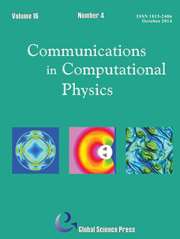Crossref Citations
This article has been cited by the following publications. This list is generated based on data provided by
Crossref.
Sun, Wenjun
Jiang, Song
and
Xu, Kun
2017.
A multidimensional unified gas-kinetic scheme for radiative transfer equations on unstructured mesh.
Journal of Computational Physics,
Vol. 351,
Issue. ,
p.
455.
Zhu, Yajun
Zhong, Chengwen
and
Xu, Kun
2017.
Unified gas-kinetic scheme with multigrid convergence for rarefied flow study.
Physics of Fluids,
Vol. 29,
Issue. 9,
Luo, Xiao-Ping
Wang, Cun-Hai
Zhang, Yong
Yi, Hong-Liang
and
Tan, He-Ping
2018.
Multiscale solutions of radiative heat transfer by the discrete unified gas kinetic scheme.
Physical Review E,
Vol. 97,
Issue. 6,
Kozelkov, A.S.
Lashkin, S.V.
Efremov, V.R.
Volkov, K.N.
Tsibereva, Yu. A.
and
Tarasova, N.V.
2018.
An implicit algorithm of solving Navier–Stokes equations to simulate flows in anisotropic porous media.
Computers & Fluids,
Vol. 160,
Issue. ,
p.
164.
Li, Shiyi
Li, Qibing
Fu, Song
and
Xu, Kun
2018.
A unified gas-kinetic scheme for axisymmetric flow in all Knudsen number regimes.
Journal of Computational Physics,
Vol. 366,
Issue. ,
p.
144.
Shuang, Tan
Wenjun, Sun
Junxia, Wei
and
Guoxi, Ni
2019.
A parallel unified gas kinetic scheme for three-dimensional multi-group neutron transport.
Journal of Computational Physics,
Vol. 391,
Issue. ,
p.
37.
Zhu, Yajun
Zhong, Chengwen
and
Xu, Kun
2019.
An implicit unified gas-kinetic scheme for unsteady flow in all Knudsen regimes.
Journal of Computational Physics,
Vol. 386,
Issue. ,
p.
190.
Sun, Wenjun
Jiang, Song
and
Xu, Kun
2019.
Multiscale Radiative Transfer in Cylindrical Coordinates.
Communications on Applied Mathematics and Computation,
Vol. 1,
Issue. 1,
p.
117.
Li, Weiming
Liu, Chang
Zhu, Yajun
Zhang, Jiwei
and
Xu, Kun
2020.
Unified gas-kinetic wave-particle methods III: Multiscale photon transport.
Journal of Computational Physics,
Vol. 408,
Issue. ,
p.
109280.
Xu, Xiaojing
Sun, Wenjun
and
Jiang, Song
2020.
An asymptotic preserving angular finite element based unified gas kinetic scheme for gray radiative transfer equations.
Journal of Quantitative Spectroscopy and Radiative Transfer,
Vol. 243,
Issue. ,
p.
106808.
Sun, Wenjun
Jiang, Song
Xu, Kun
and
Cao, Guiyu
2020.
Multiscale Simulation for the System of Radiation Hydrodynamics.
Journal of Scientific Computing,
Vol. 85,
Issue. 2,
Shi, Yi
Sun, Wenjun
Li, Lingxiao
and
Song, Peng
2021.
An improved unified gas kinetic particle method for radiative transfer equations.
Journal of Quantitative Spectroscopy and Radiative Transfer,
Vol. 261,
Issue. ,
p.
107428.
Xu, Xiaojing
Jiang, Song
and
Sun, Wenjun
2021.
A positive and asymptotic preserving filtered P method for the gray radiative transfer equations.
Journal of Computational Physics,
Vol. 444,
Issue. ,
p.
110546.
Zhu, Yajun
Zhong, Chengwen
and
Xu, Kun
2021.
GKS and UGKS for High-Speed Flows.
Aerospace,
Vol. 8,
Issue. 5,
p.
141.
Lu, Yulong
Wang, Li
and
Xu, Wuzhe
2022.
Solving multiscale steady radiative transfer equation using neural networks with uniform stability.
Research in the Mathematical Sciences,
Vol. 9,
Issue. 3,
Yang, Di
Peng, Gang
and
Gao, Zhiming
2022.
A Positivity-Preserving Finite Volume Scheme for Nonequilibrium Radiation Diffusion Equations on Distorted Meshes.
Entropy,
Vol. 24,
Issue. 3,
p.
382.
Pan, Dongxin
Zhang, Rui
Zhuo, Congshan
Liu, Sha
and
Zhong, Chengwen
2022.
A Multi-Degree-Of-Freedom Gas Kinetic Multi-Prediction Implicit Scheme.
SSRN Electronic Journal,
Xu, Xiaojing
Jiang, Song
and
Sun, Wenjun
2023.
Spatial Second-Order Positive and Asymptotic Preserving Unified Gas Kinetic Schemes for Radiative Transfer Equations.
Journal of Scientific Computing,
Vol. 96,
Issue. 3,
Pan, Dongxin
Zhang, Rui
Zhuo, Congshan
Liu, Sha
and
Zhong, Chengwen
2023.
A multi-degree-of-freedom gas kinetic multi-prediction implicit scheme.
Journal of Computational Physics,
Vol. 475,
Issue. ,
p.
111871.
Zhang, Xiaojiang
Song, Peng
Shi, Yi
and
Tang, Min
2023.
A fully asymptotic preserving decomposed multi-group method for the frequency-dependent radiative transfer equations.
Journal of Computational Physics,
Vol. 491,
Issue. ,
p.
112368.


